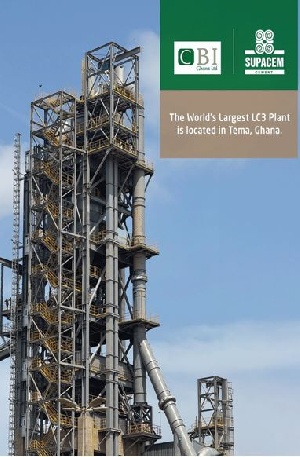Business News of Tuesday, 15 April 2025
Source: www.ghanawebbers.com
Supacem’s US$100m plant to cut clinker import dependency
Recent price increases and supply disruptions are affecting Ghana's construction sector. These issues limit cement availability and drive up costs.
Local cement retailers are struggling with widespread shortages. Builders have limited access to essential materials due to this situation. A severe shortage of clinker, a key raw material for cement, is behind these disruptions.
The current clinker scarcity results from international supply chain issues. Rising export prices from the Mediterranean rim, a major clinker source, contribute to this problem. For Ghana, these global dynamics lead to supply shortages and higher costs for retailers and consumers.
Ghana's cement industry heavily relies on imported clinker. This dependence makes it vulnerable to foreign supply problems and market volatility. Supacem's US$100 million investment in LC3 technology aims to reduce this reliance by using local raw materials.
The new plant processes locally-sourced materials into a reactive substance that partially replaces clinker in cement production. This reduces the need for expensive imports.
A significant milestone was achieved when the Ghana Standards Authority adopted the latest LC3 standard in 2024. This followed two years of collaboration among various Ghanaian institutions and international partners. The new standard, GS PAS 5:2024, supports sustainable and locally-sourced cement production.
Supacem’s innovative approach benefits Ghanaians and the economy significantly. By producing more of their own materials, they lessen the impact of clinker shortages. This leads to a more reliable cement supply for retailers and builders in Ghana.
The project also promotes economic growth by creating over 160 direct jobs through local sourcing efforts in Tema and Torgome. Additionally, Supacem empowers local women through training programs that expand opportunities in the industry.
While recent price hikes were due to port charges, a better raw material supply chain could stabilize prices for consumers nationwide. The environmental impact is notable as LC3 production significantly lowers CO2 emissions compared to traditional methods.
This aligns with Ghana's climate action commitments while contributing to a greener future for the nation. Supacem’s investment in a world-class laboratory develops local talent in advanced LC3 technology.
This positions Ghana as a leader in sustainable cement production across Africa. The project strengthens the local economy by reducing import reliance and adding value to domestic resources.
Supacem has taken significant steps toward transforming Ghana's cement industry. They have extended their supply of locally produced LC3 materials to Ghacem, Ghana’s largest manufacturer, further reducing clinker imports.
Emmanuel Cherry, CEO of the Ghana Chamber of Construction Industry, advocates exploring local alternatives for clinker use. Supacem’s investment addresses this need while showcasing Ghanaian ingenuity and resources.
Overall, Supacem’s initiative provides solutions for the current cement shortage while laying groundwork for a sustainable industry in Ghana. This effort aims at building infrastructure alongside fostering a stronger and greener economy.











